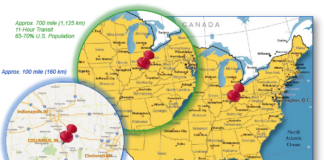Agriculture Secretary Tom Vilsack has announced the establishment of four additional Biomass Crop Assistance Program (BCAP) project areas to promote the cultivation of crops that can be processed into renewable energy.
Acreage in Arkansas, Missouri, Ohio and Pennsylvania will be designated to grow giant miscanthus, a sterile hybrid warm-season grass that can be converted into energy to be used for heat, power, liquid biofuels, and bio-based products.
“Renewable, home-grown, clean energy from American producers is vital to our country’s energy future because it reduces our reliance on foreign oil and creates good-paying production jobs that cannot be exported,” said Vilsack. “Today’s announcement will make a significant contribution to rural America and create nearly 4,000 jobs, demonstrating the great economic potential the production of renewable energy holds for our rural communities.”
It is estimated that each of the four project areas and conversion facilities would earn about $50 million per year.
According to industry estimates, a large number of biorefinery, agriculture and support jobs will be created in each area. The estimates are: Ashtabula, Ohio — 1,210 jobs added; Paragould, Ark. — 750 jobs added; Aurora, Mo. — 960 jobs added; and Columbia, Mo. — 980 jobs added. These numbers are estimated based on an economic impact study that measures the amount of jobs the projects will generate by 2014.
There is also the possibility of establishing “green hubs” in the project areas leading to other green industries, including green industrial parks.
Yields for biomass from giant miscanthus are expected to range between 10 and 12 tons of dry matter per acre and can be as high as 15 tons per acre.
BCAP project areas provide financial incentives to eligible agriculture producers to establish dedicated energy crops that will be used for production of heat, power, liquid biofuels or bio-based products.
A project area must have specific boundaries that are approved by the Secretary of Agriculture.
These project areas include:
Project Area Number 2 is in Arkansas and targets 2011 enrollment of 5,588 acres in Craighead, Greene, Jackson, Lawrence, Mississippi, Poinsett, and Randolph counties. The sponsor for this project is MFA Oil Biomass LLC and the project area surrounds the co-op’s biomass conversion facility in Paragould, Ark.
Project Area Number 3 is in Missouri, and targets 2011 enrollment of 3,000 acres in Audrain, Boone, Callaway, Cole, Cooper, Howard, Moniteau, Monroe and Randolph counties. The sponsor for this project is MFA Oil Biomass LLC and the project area surrounds the co-op’s biomass conversion facility in Columbia, Mo.
Project Area Number 4 is in Missouri, and targets 2011 enrollment of 5,250 acres in Barry, Christian, Dade, Jasper, Lawrence, Newton, and Stone counties. The sponsor for this project is MFA Oil Biomass LLC and the project area surrounds the co-op’s biomass conversion facility in Aurora, Mo.
Project Area Number 5 is in parts of Ohio and Pennsylvania and targets 2011 enrollment of 5,344 acres in Ashtabula, Geauga, Lake, and Trumbull, Ohio, and Crawford, Erie, and Mercer counties, Pennsylvania. The sponsor for this project is Aloterra Energy, LLC and the project area surrounds the company’s biomass conversion facility in Ashtabula, Ohio.
Earlier this year, USDA announced BCAP Project Area Number 1 that comprised up to 50,000 acres for establishing a dedicated energy crop of native grasses and forbs for energy purposes in 39 counties in central and western Missouri and eastern Kansas.
USDA provides an opportunity for teams of crop producers and bioenergy facilities to submit proposals to USDA to be selected as a BCAP project area. Selected producers are eligible for reimbursements of up to 75 percent of the cost of establishing a perennial bioenergy crop.
They can receive up to five years of annual payments for herbaceous crops (annual or perennial) and up to 15 years of annual payments for woody crops (annual or perennial). BCAP, which was authorized in the 2008 Farm Bill, is a primary component of the strategy to reduce U.S. reliance on foreign oil, improve domestic energy security, reduce pollution and spur rural economic development and job creation.
The sign-up period for these project areas begins on Monday, June 20, 2011. The deadline to sign up for the project areas will be announced at a later date.
The Farm Service Agency (FSA), administering the program on behalf of the Commodity Credit Corporation with conservation planning assistance from the Natural Resources Conservation Service (NRCS) and other partners, will enter into contracts with landowners and operators in these project areas.
Producers interested in participating in the project areas should visit their local FSA county office.














![[VIDEO] Get More for Your Business in Ardmore. Oklahoma](https://businessfacilities.com/wp-content/uploads/2024/02/maxresdefault-324x160.jpg)
